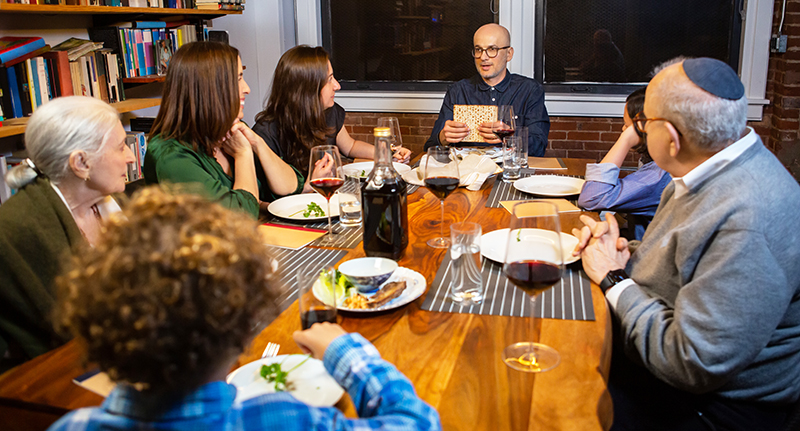- Counseling & Mental Health
- Spiritual Services
- Israel Response
By Robyn Bloom, LMFT, Director of Adult Services and Rabbi Daniel Isaacson, Director of Spiritual Care at JFCS
Every year during Passover, we share our homes with family and friends and tell the Jewish people’s story of liberation from slavery in Egypt. But this year, after the trauma of October 7 and the ensuing six months of war, some of us may feel worried about the upcoming holiday. How do we make meaningful Passover seders this year for everyone around our tables? How do we stay connected despite differences of opinion?

Here are four principles, grounded in parts of the traditional seder, that we hope will help you navigate conversations and bring you together during this challenging time.
The meaningful nature of the seder is in the questions asked, not necessarily in the answers given. We connect with each other through our dialogue and by listening and honoring each other.
Lead with curiosity.The Four Questions encourage us to learn something new. Consider ways to hold the story in a fresh way. How have the events of the past six months impacted the way we understand the story this year? Every year that we tell the story, we are in new places and we can look with fresh eyes. Recognize and honor our differences.The Four Children remind us that everyone sees the world through their own special lens. Everyone sitting around the table has a valuable perspective, one which is shaped by many factors including the time they have grown up in and the particular news they receive on their social media feeds. The seder is an opportunity to practice honoring each person’s unique view by deeply listening. Learn together.The Magid section of the Haggadah is where one generation tells the story of Passover to the next. And each of us need to make the Passover story personally meaningful, as though we are experiencing the Exodus for ourselves. We open ourselves up to learn from one another and embrace differing opinions with open hearted exploration of the issues. Practice gratitude.In singing Dayenu, we acknowledge the good and are grateful for our freedom, family, health, wellbeing, and the opportunity to be together on this special day. Even amidst pain and suffering in the world, Jewish tradition always encourages us to appreciate the good things in our lives. |
Other Resources
How do we stand with those members of the wider community who stand for something else? Are there rules of engagement on responding to that squirm-inducing moment when encountering a view different from one’s own?
For other thoughts on how to manage difficult conversations, read How to Talk About Israel with Someone You Disagree With by Elliott Cosgrove.
Other References for Responding to Antisemitism and Understanding the Israel-Hamas War
7 Ways Some Anti-Israel Protests Have Spread Antisemitism (American Jewish Committee—AJC)
A Background on Hamas (Anti-Defamation League—ADL)
Recognizing and Responding to Problematic Rhetoric (JCRC Bay Area)
Guide for Recognizing and Responding to Antisemitism (JFCS Holocaust Center)
The History of Antisemitism (A UC Berkeley Film)
See a full list of resources on the JFCS Holocaust Center website.
